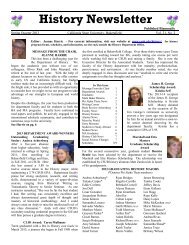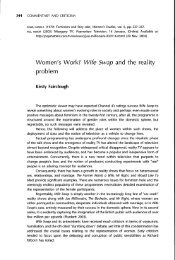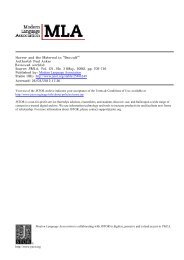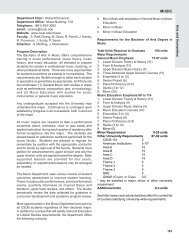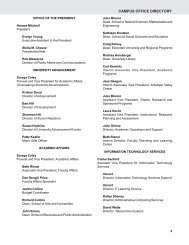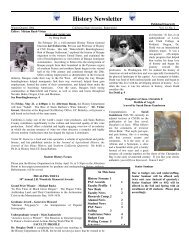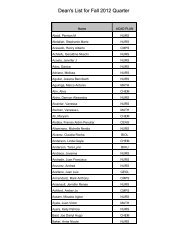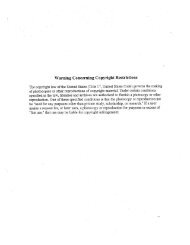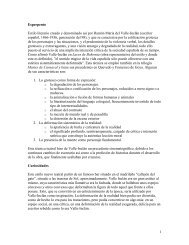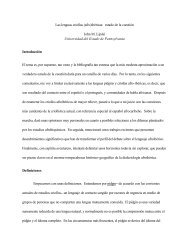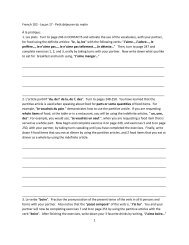''Don't Ask me, I'm Just a Girl'': Feminism, Female Identity, and The ...
''Don't Ask me, I'm Just a Girl'': Feminism, Female Identity, and The ...
''Don't Ask me, I'm Just a Girl'': Feminism, Female Identity, and The ...
Create successful ePaper yourself
Turn your PDF publications into a flip-book with our unique Google optimized e-Paper software.
Don’t <strong>Ask</strong> <strong>me</strong>, I’m <strong>Just</strong> a Girl 295<br />
defined in rather traditional ways, i.e., through service to <strong>me</strong>n, secondclass<br />
status, <strong>and</strong> a passive mindset. Marge tells Lisa, ‘‘I had a Malibu<br />
Stacy when I was your age, <strong>and</strong> I turned out just fine. Now, let’s forget<br />
our troubles with a big bowl of strawberry ice cream.’’ Without com<strong>me</strong>nt,<br />
Lisa pulls the string <strong>and</strong> makes her point through Stacy, who<br />
says ‘‘Now, let’s forget our troubles with a big bowl of strawberry ice<br />
cream.’’ Clearly, generational differences set Marge <strong>and</strong> Lisa apart.<br />
Whereas Marge is often conflicted in her opinions <strong>and</strong> vacillates between<br />
positions, Lisa has inherited the successes of first- <strong>and</strong> secondwave<br />
feminists <strong>and</strong> has grown up with a faith in true equality; she is a<br />
political activist, a vegetarian, a voice of reason, <strong>and</strong> an avowed feminist.<br />
She is also most often the moral center of the show, which gives<br />
her views on gender <strong>and</strong> feminism special relevance.<br />
Undeterred, Lisa calls the Malibu Stacy hotline to complain <strong>and</strong><br />
discovers that she can take a factory tour <strong>and</strong> thus ‘‘complain in person.’’<br />
Perhaps in reconsideration of her earlier state<strong>me</strong>nt, Marge accompanies<br />
Lisa on the tour. Lisa <strong>and</strong> Marge (the only persons on the<br />
tour) watch a brilliantly conceived parody of corporate propag<strong>and</strong>a<br />
films, this one detailing the origins of Malibu Stacy, ‘‘A<strong>me</strong>rica’s favorite<br />
eight-<strong>and</strong>-a-half incher.’’ <strong>The</strong> film ends with Stacy again claiming<br />
‘‘Don’t ask <strong>me</strong>. I’m just a girl [tee hee, tee hee]’’ <strong>and</strong> a male voice-over<br />
that concludes ‘‘She sure is.’’ At this point, the show takes on a number<br />
of political concerns, though most prominently the sexist attitudes that<br />
persist in the workplace <strong>and</strong> wo<strong>me</strong>n’s own responsibility in perpetuating<br />
sexism in the culture. When the woman giving the tour asks if<br />
there are any questions, Lisa says ‘‘Yes, I have one. Is the remarkably<br />
sexist drivel spouted by Malibu Stacy intentional, or just a horrible<br />
mistake?’’ Without missing a beat, the woman says ‘‘Believe <strong>me</strong>, we’re<br />
very mindful of such concerns around here,’’ after which a male employee<br />
opens a door behind her <strong>and</strong> calls out ‘‘Hey, Jiggles. Grab a pad<br />
<strong>and</strong> back that gorgeous butt in here.’’ Good naturedly, ‘‘Jiggles’’ giggles,<br />
enters the room, <strong>and</strong> closes the door behind her with her rear end.<br />
Marge <strong>and</strong> Lisa simply grimace ‘‘Mmmmmmm.’’<br />
Having witnessed sexism in action, Lisa is more determined than<br />
ever to do so<strong>me</strong>thing, so she seeks out the creator of Malibu Stacy,<br />
Stacy Lovell, <strong>and</strong> proposes that they make an alternative talking doll.<br />
At first, Ms. Lovell is skeptical, but after hearing what the Malibu<br />
Stacy doll is saying to an entire generation of little girls (e.g., ‘‘Thinking<br />
too much gives you wrinkles’’), she decides to help Lisa design a



